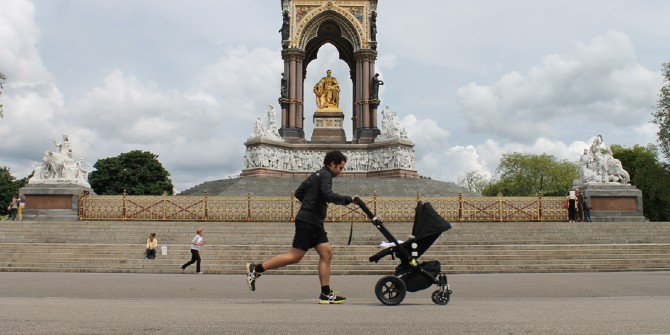Why was Britain so hard hit by COVID? In their book, After the Virus, Simon Szreter (University of Cambridge) and Hilary Cooper look at how the neoliberalism and austerity of the last 40 years left the country peculiarly vulnerable to a shock such as the pandemic. They go back much further, to the Elizabethan era, to see how our earlier history might help us to chart a way out of malaise. Ros Taylor (LSE) reports on After the Virus, an event hosted by the LSE’s School of Public Policy to mark the launch of the book.
Chancellor Rishi Sunak’s budget statement in October 2020 was widely reported to have increased the size of the state to the levels of half a century ago. ‘Public spending will be at its highest sustained level since the 1970s,’ said the FT. Yet the comparison is misleading. While Sunak has halted austerity, he has not reversed it. Unlike in the postwar period, taxes are regressive, with wealth taxes untouched. The public spending cuts of the austerity years in welfare payments, health capacity and pandemic planning left us ill-prepared for the pandemic, and the poorest, who were most likely to work in insecure frontline jobs with poor sick pay, suffered a mortality rate twice as high as the richest.
Surprisingly, perhaps, England created the world’s first welfare state, and it began a long time before the postwar Beveridge Report. Welfare states are not a modern democratic creation, nor a luxury for wealthy nations that can be cut back in hard times with no serious harm to the economy. They are an essential precondition for prosperity.
The protection that Elizabeth I’s Poor Laws gave to those experiencing hardship was ground-breaking. At their height, they transferred enough money to support 10 percent of the population for six months. Everyone knew that they had the statutory entitlement to basic state support if they were sick, disabled, elderly or involuntarily unemployed.
The Elizabethan welfare state was an essential precondition for the Industrial Revolution. It facilitated what we call collectivist individualism and became the driving principle of a dynamic and nurturing society.
The Poor Laws facilitated labour mobility on a mass scale
Our political view of collectivism and individualism often assumes they are opposing forces. In fact, Britain has been economically strongest when it combines them. This is because, apart from the very rich, individuals cannot thrive unless society provides them with resources – education, income, security, and health. When that happens – as it has during two key periods in Britain’s history – productivity, social mobility and growth all take off. The first of these periods lasted right through from 1601 until the 1830s and the second was the three decades after the second world war often known as ‘the golden age’.
The Poor Laws, which were enacted in 1598 and 1601, were founded on the compulsory progressive taxation of land. At the time, land was the main source of wealth. Taxes were levied in all of England’s 10,000 parishes. Each one was a miniature welfare state, deployed to support those in need during the shortages and threatened famines that regularly and unpredictably afflicted all early modern societies. Protecting society against these crises was extremely important. From 1624, there was no further famine – the whole population of England was guaranteed food security – over 150 years earlier than anywhere else in Europe.
The Poor Laws also facilitated labour mobility on a mass scale. The poor were free to move to cities to look for jobs, knowing that their parents would be cared for. They knew they themselves would not be left by the wayside to starve. The worst outcome would be that a person looking for work would be removed back to their parish of settlement, at the expense of the parish removing them. Then they could try their luck again.
The Laws also supported England’s apprenticeship system. The country experienced exceptional growth between 1600 and 1800, with the proportion of urban residents growing by 350 percent. This was ten times greater than anywhere else in Europe, even the Netherlands. It transformed the economy.

In 1834, this generous provision was replaced by the threat of the workhouse. The negative effects immediately became apparent as a trend of increasing life expectancy was halted. It did not change between 1820 and 1870. Then British economic productivity began to decline, overtaken by the United States (which invested in education) and Germany (where Bismarck’s reforms provided unemployment insurance). As workhouses filled up with the old and infirm, the Boer War exposed the level of malnutrition among the lower classes.
The new Liberal government of 1906 responded by bringing in old-age pensions and health insurance, but it was all rather late in the day. The 1920s and 1930s saw no further expansion in state provision.
The Laws were founded on the compulsory progressive taxation of land
After the devastation of the second world war, the welfare state underwent a rapid expansion. Family allowances were paid to mothers, secondary schooling was free for everyone, the NHS was created and the government embarked on a major programme of house rebuilding.
The growth in productivity between 1951 and 1973 was the highest in British history, and it took place at a time of full employment. Wealth and incomes were taxed progressively. Atop rate of marginal tax between 80 and 90 percent was apparently no obstacle to substantial economic growth.
Rather than rejecting the lessons of the past, we should commit to a new morality of collective support. We could start by aligning the taxation of capital and earned income, which would raise significant revenue. New laws to encourage businesses to create value for society, rather than extracting it, are overdue. Giving the vote to everyone aged 15 and over would help to redress the short-term priorities of an ageing society and enable a focus on investing to address the challenge of climate change for future generations.
Collectivism and individualism are not in opposition to each other. British society, and our economy, has flourished when it has embraced social security and a facilitating welfare state to which all contribute in progressive proportion to their means. COVID is merely a dress rehearsal for the challenges – of poverty, inequality and global warming – we will face during the rest of the 21st century.
This post does not represent the views of the COVID-19 blog, nor LSE. It is based on After the Virus: lessons from the past for a better future, an LSE event hosted by the School of Public Policy on 1 February 2022.
Simon Szreter is Professor of History and Public Policy and a fellow of St John’s College, University of Cambridge. Hilary Cooper is an economic consultant, researcher and writer. Her early career was as a government economist and senior policy maker.





